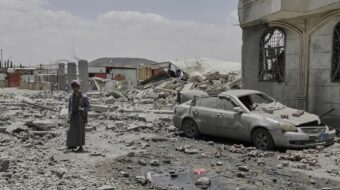Palestine: Women suffer under Israeli occupation
Living conditions facing Palestinian women in the West Bank and Gaza – including their access to health, education, food and employment – have sharply deteriorated over the past several years. A March 8 report by the UN Office for the Coordination of Humanitarian Affairs says Palestinian women “have been deeply affected by movement restrictions, military incursions, and house demolitions, particularly in Rafah, where almost 10,000 Palestinians … have been made homeless” because of Israeli actions.
The report says 52 pregnant women gave birth at military checkpoints since 2002, and that 19 women and 29 newborns died at those checkpoints between September 2000 and December 2002. Nearly 38 percent of Palestinian mothers report that access to health services has become difficult, with 44 percent attributing that to the Israeli siege and 28 percent citing the lack of money to pay for health services.
The UN agency called on the Israeli authorities “to provide safe and unconditional access to health services, education, employment, food and other supplies,” the Palestinian Authority to improve services, and called on all parties to uphold international humanitarian law protecting civilians, including women.
Greece: Election results, U.S. military exercises
Parliamentary elections on March 7 resulted in the right-wing New Democratic Party gaining a majority of deputies (165), thereby entitling it to form a new government. The incumbent party, the social-democratic PASOK, lost 41 seats, dropping to 117. PASOK’s losses reflect popular frustration with its failure to deliver on reforms, according to various observers. The Communist Party of Greece gained one seat, bringing its total to 12, while the left-leaning Synaspismos party held its own at six.
Meanwhile, some 2,000 security personnel, including 400 U.S. soldiers, are slated to start a two week anti-terrorism exercise as part of preparations for the August Olympic Games.
Very little has been made public concerning the politically sensitive maneuvers, the Greek newspaper Kathimerini said last week. The government has refused to reveal the exact legal status under which the U.S. military personnel will function.
WFTU: Solidarity with working women
In its greeting to working women on International Women’s Day, the World Federation of Trade Unions condemned the extreme insecurity and poverty experienced by millions of women and their families, especially in countries affected by war, military occupation and civil conflicts. The WFTU especially highlighted the urgent need for international solidarity with women and children in Israeli-occupied Palestine, U.S.-occupied Iraq and those who are victims of economic blockades against their countries, as well as women trade unionists and activists who suffer brutal violation of trade union and human rights in countries such as Colombia.
The WFTU called for an end to all forms of discrimination against women, especially in workers’ rights and compensation; adequate protection for women in agriculture, handicrafts, the informal sector, and special zones where labor law does not apply; for support to family life; and above all, for peace and security in the world.
South Africa: Gov’t questions Haiti coup
South African Foreign Affairs Minister Nkosazana Dlamini-Zuma said last week that if Haitian President Jean-Bertrand Aristide had been forced from power against his will, it would have “serious consequences and ramifications for the respect of the rule of law and democracy the world over.” She added, “The international community must not be seen to be wavering in its commitment to democracy and respect for the rule of law, particularly in the face of anti-democratic forces.”
Zuma said she fully supported the position of the Caribbean Community (Caricom) in demanding the United Nations investigate the Haitian president’s removal.
China: First Chinese-Braille computer
Two companies in Heilongjiang Province in northeastern China have developed a computer allowing the blind and partially sighted to access the Internet with a Chinese-Braille keyboard. The new Tongchuang Blue Sky computer is equipped to code and decode Chinese and Braille, and has voice software to read the screen to the user.
Blind users can now learn to send and receive e-mails within two days, said the inventor of the Chinese-Braille keyboard, Hou Qingyou, a teacher of blind students whose own vision is limited.
Some 9 million people in China suffer serious eye diseases, and over 5 million of them are blind.
International Notes are compiled by Marilyn Bechtel (cpusainternat@mindspring.com).
Julia Lutsky contributed to this week’s notes.









